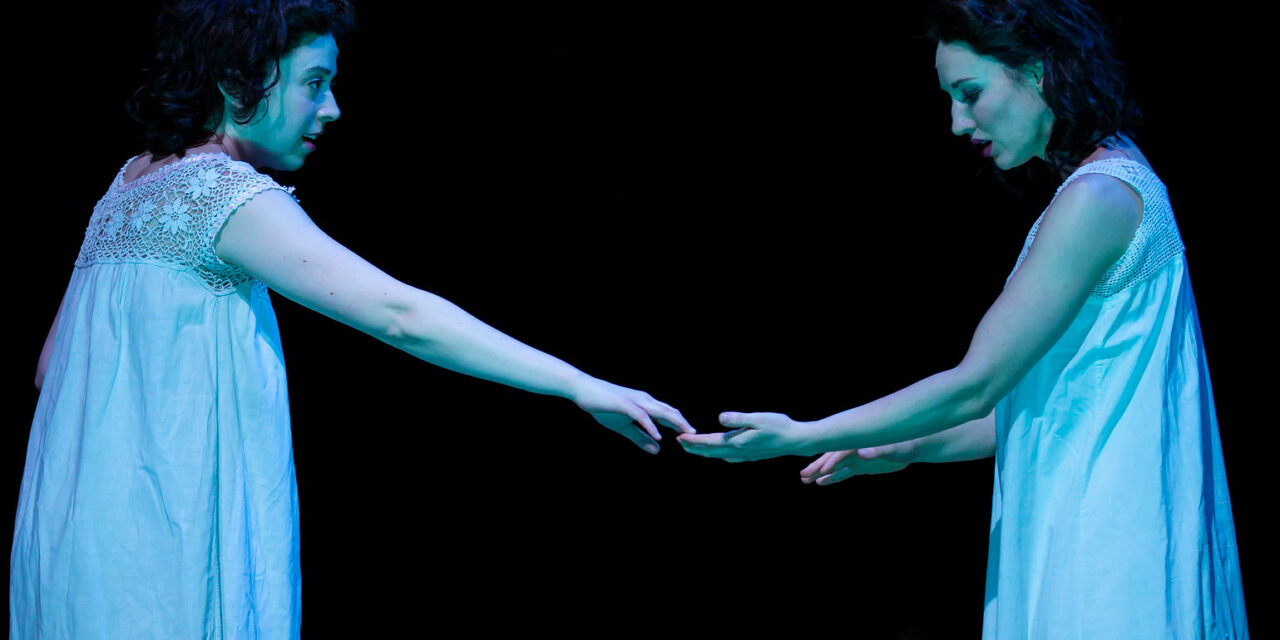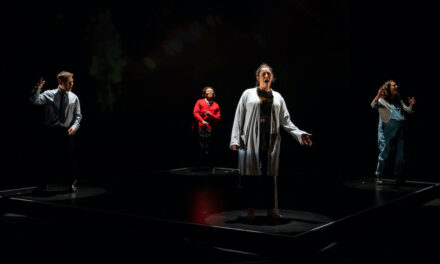Boston is privileged to welcome Indecent, Paula Vogel’s and Rebecca Taichman’s adaptation of Sholem Asch’s 1907 God of Vengeance (Got fun Nekome) which became the first play to be banned on Broadway for sexual impropriety. Asch, a well-educated Polish Jew was interested in broadening Yiddish literature so that it dealt with the problems, developments, and realities of the period. His works became popular and were translated into numerous European languages. He was particularly proud when the esteemed German-Jewish director Max Reinhardt mounted the first production of God of Vengeance with the renowned actor Rudolph Schildkraut as the male lead, Yankel Chapchovich, known as the “Uncle” who earns his living running a brothel in the basement of his house.
He and his wife Sarah, a former prostitute, have one child Rifikele, a girl still in her teens, whose purpose in her father’s mind is that she redeems him by marrying a son of a rabbi or even a rabbi. Unknown to him Rifikele has fallen in love with Manke a harlot from downstairs and fears her father’s discovery. In one of the work’s strongest moments, the two girls appear on stage together shrouded in a wet shawl and play at being husband and wife hugging and kissing. Manke convinces Rifikele to run off with her to another whore house. Rifikele’s mother finds her and brings her back. Her father emotionally destroyed by her behavior refuses to let her marry and drags her downstairs as the curtain falls.
David Kessler a well-known Yiddish actor-manager in New York, attracted by the role of the father in God of Vengeance, produced it in 1907. The Yiddish newspapers of the period worried that the lesbian relationship might incite anti-Semitism.
In 1914 during the First World War Asch moved to New York with his wife Madje, became an American citizen, and began writing for the “Jewish Forward.” As a backlash to recent waves of immigration, the Emergency Quota Act was passed in 1921 limiting the number of settlers allowed to enter the country, particularly those from Eastern and Southern Europe and Africa. Also during the 1920s a reaction to the growing pop culture and the freedom it championed brought about a counter-movement to “prevent lewdness on the stage.”
Also in 1921, an English translation of God of Vengeance opened at the Provincetown Playhouse in Greenwich Village. From there it moved to Broadway where it was denounced by a rabbi. Unknown to Asch, the producer/lawyer Harry Weinberger had cut the love scene in the rain likely because he was wary of the uptown audience’s response to lesbian love. Nevertheless, the cast and Harry Weinberger were arrested and briefly jailed for indecency. Three years later the trial was held with Weinberger, a well-known civil rights lawyer, defending himself and the cast. They were found not guilty. In the 1990s, the play was revived several times by remaining Yiddish companies.
Playwright Paula Vogel came across God of Vengeance in the 1970s as a graduate student at Cornell, a time when few plays dealt with homosexual relationships. When she discovered the passionate love story between Rifikele and Manke, she was inspired. That this play was written by a heterosexual man in the early twentieth century amazed her. However, when she wrote a comedy about two women’s fantasy life, her teachers shunned it.
Almost thirty years later Rebecca Taichman, then a Master’s student in directing at the Yale School of Drama explored Asch’s play and the transcripts of the trial for her thesis project which she called The People vs “The God of Vengeance.” Taichman like Vogel had learned Yiddish in her childhood and finds its extinction tragic. After receiving her degree she wanted to develop the piece further but felt she did not have the writing skills. She was delighted when Paula Vogel accepted her invitation. They collaborated on it for seven years, sometimes with the cast-to-be, before it opened on Broadway in April of 2017 where it played at the large Cort Theatre which contains almost 1,100 seats, not the best environment for a small cast show. Indecent was nominated for three Tony awards and won two: Best direction of a play went to Rebecca Taichman and best lighting design went to Christopher Akerlind. Paula Vogel received the Hull-Warriner Award, which is given to playwrights by playwrights. Indecent’s popularity grew over time and its run was extended several months beyond its original closing date. In November of 2017, PBS presented Indecent on its Great Performance series. The film is still available.
The production at Boston’s Huntington Theatre directed by Rebecca Taichman has many of the Broadway cast members and musicians. With the exception of Richard Topol who plays Lemml, the stage manager, each actor plays a variety of roles. Other Brechtian techniques such as breaking the fourth wall, using song, narration, titles, and text projections enrich the presentation.
Indecent begins with the characters and musicians sitting on chairs lined up on stage. As Lemml, the stage manager introduces the six company actors and three musicians, they stand up and ashes fall from their sleeves. The musicians begin to play klezmer music using a violin, an accordion, and a clarinet as the actors sing and dance joyously.
We learn that Asch’s wife Madje is impressed by its morality, beautiful language, and the love of the two girls. Her reaction differs from many other Jews. When Asch brings the script of God of Vengeance to Isaac Leib Peretz, a modernist Jewish intellectual and writer in Warsaw, Peretz advises him to burn it. Unlike Peretz, Asch says he wants to write for everyone.
Over time, Asch becomes disillusioned with the U.S. while the actors do their best to become Americanized, but have difficulty with English. After God of Vengeance closes, the actors and Lemml return to Poland where anti-Semitism is on the rise and the Germans will soon occupy the country. They are compelled to wear stars of David to identify them as Jews. The group lives in an attic in the Warsaw Ghetto where in order to survive they perform one act of God of Vengeance per night hoping to be paid in food or money. The actors, musicians, and Lemml are rounded up and sent to Auschwitz.
Asch has turned on his own play and will no longer permit it to be performed.
Indecent is very well acted, and directed and extremely moving. Adina Verson and Elizabeth A. Davis are excellent as Rifikele and Manke the two lovers in the God of Vengeance scenes. The play is timely given the rise of anti-Semitism and racism both here and abroad.
Indecent plays through May 25 at the Huntington Theatre at 264 Huntington Avenue, Boston. MA
ACTORS: Richard Topol, Elizabeth A. Davis, Joby Earle, Harry Groener, Mimi Lieber. Steven Rattazzi. Adina Verson
MUSICIANS: Matt Darriau. Patrick Farrell. Lisa Gutkin
This article was originally posted on Capital Critics’ Circle on May 9 and has been reposted with permission.
This post was written by the author in their personal capacity.The opinions expressed in this article are the author’s own and do not reflect the view of The Theatre Times, their staff or collaborators.
This post was written by Jane Baldwin.
The views expressed here belong to the author and do not necessarily reflect our views and opinions.

















